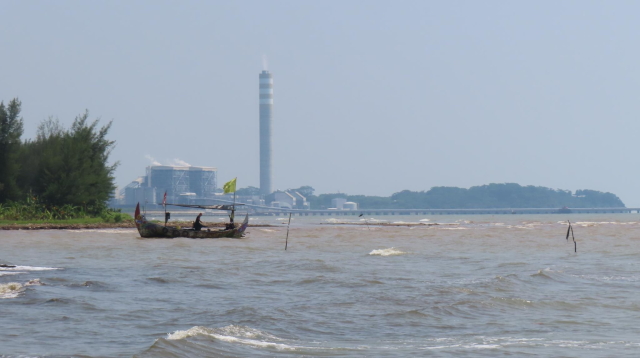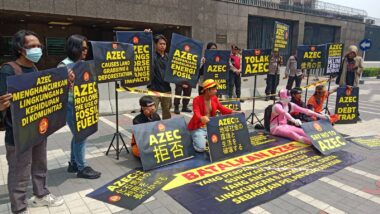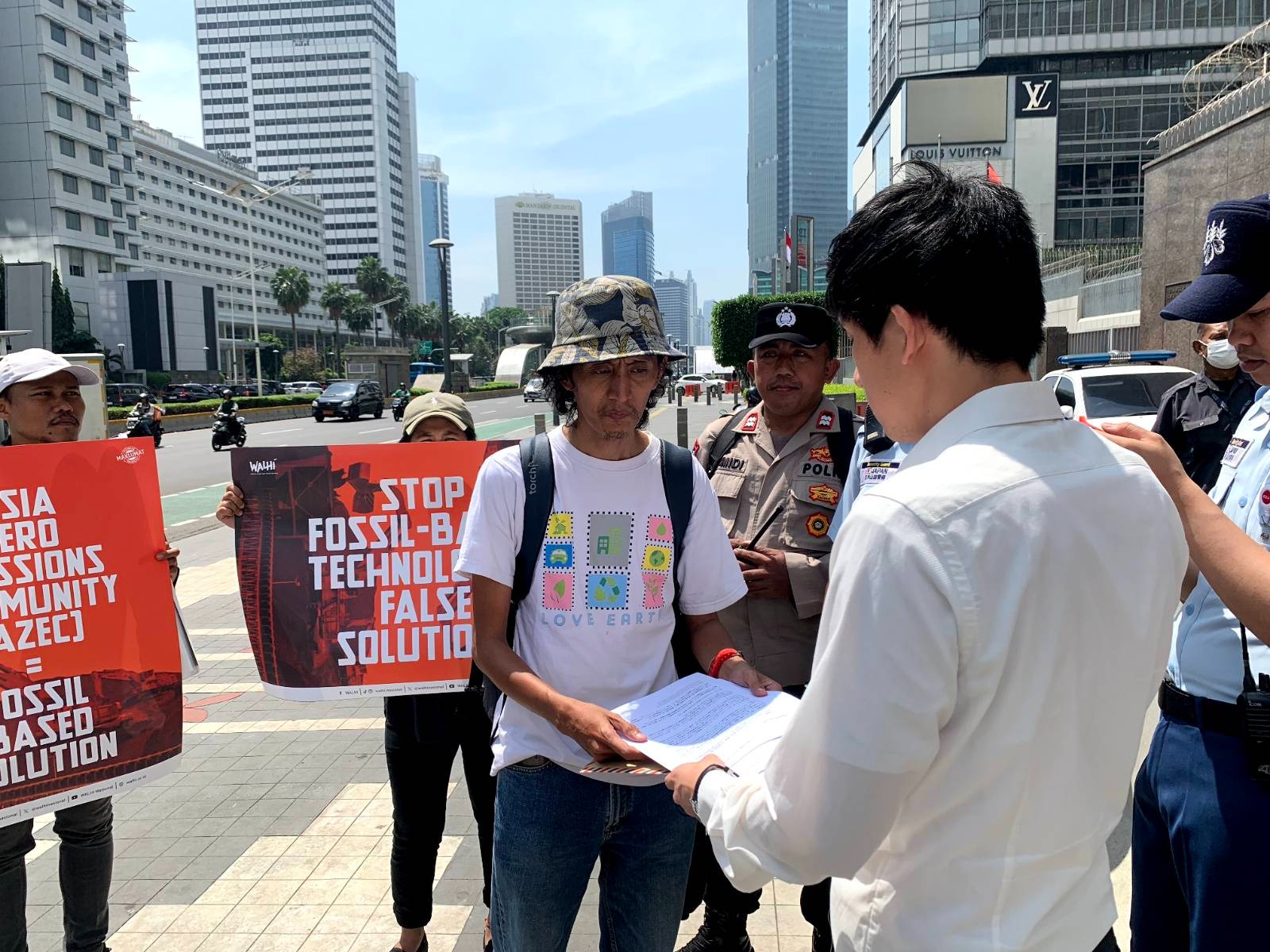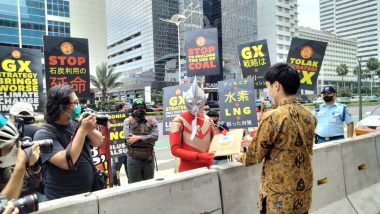[Statement by Indonesian CSOs]Reject the Batang CCGT Project: A False Energy Transition, A Real Threat to Communities and Coastal Ecosystems

(Photo: July 2025)
On October 23, 2025, the Indonesian Forum for the Environment (WALHI / Friends of the Earth Indonesia) issued a statement strongly calling for the cancellation of a new gas-fired power plant project currently under a feasibility study in Batang Regency, Central Java. The project, undertaken by Electric Power Development Co., Ltd. (J-POWER), ITOCHU Corporation, and Adaro Power under the Asia Zero Emission Community (AZEC) initiative, was denounced by WALHI as an attempt to perpetuate the use of fossil fuels under the guise of energy transition and as a project that poses further threats to local communities and coastal ecosystems already severely damaged by the existing Batang coal-fired power plant.
The Batang Combined Cycle Gas Turbine (CCGT) power plant project was announced at the 2nd AZEC Ministerial Meeting held in Jakarta in August 2024, when the three companies signed a memorandum of understanding (MoU) to conduct a feasibility study. According to the document “MOUs towards 2nd AZEC Ministerial Meeting” published by Japan’s Agency for Natural Resources and Energy, the proposed CCGT plant is planned to be built on a 30-hectare site adjacent to the Batang coal-fired power plant (2 units × 1,000 MW), which the same three companies constructed and which has been in operation since 2022.
The Batang coal-fired power plant project has faced strong opposition from local residents since as early as 2011, even before full-scale construction began. Residents, concerned about the project’s impacts on their livelihoods such as farming and fishing, voiced their resistance, and the project also drew significant international criticism. Reports have documented serious human rights violations, including forced land acquisitions and the arbitrary arrest and imprisonment of several residents who opposed the project. The Indonesian National Commission on Human Rights (Komnas HAM) issued recommendations urging the project developers to improve the human rights situation. In addition, local residents filed an objection against the Japan Bank for International Cooperation (JBIC) —a government-owned financial institution under Japan’s Ministry of Finance—which financed the project.
Ignoring the opposition of local residents and criticism from both inside and outside the country, the Batang coal-fired power plant project was pushed forward and, as stated in WALHI’s recent statement, continues to cause serious harm to local communities — including declining fish catches, damaged fishing nets, and worsening coastal abrasion. WALHI warns that the same three companies that forcefully advanced the coal project are now pursuing a gas-fired power plant in the same area, raising a high risk that the voices of local residents will once again be ignored and environmental destruction will be repeated.
WALHI also points out that gas is a fossil fuel that emits large amounts of greenhouse gases—including methane—throughout its entire supply chain, from extraction to combustion. The organization warns against the current promotion of gas as a so-called “transition energy” under the AZEC framework, and strongly criticizes AZEC as nothing more than greenwashing that legitimizes technical and financial support for gas-related projects which prolong dependence on fossil fuels.
To date, no consultations have been held with local communities regarding the Batang CCGT power plant project. The project developers, including Japanese companies, must ensure that the problems caused by the past development project are not repeated and must listen sincerely to the voices of Indonesian civil society, which has clearly stated that “Batang is not an experimental field. The coast is not a dumping ground. Transition is not an excuse for destruction.” And they are urged to immediately halt the promotion of “false solutions” to climate crisis—initiatives carried out in the name of AZEC or decarbonization that, in reality, endanger the livelihoods and environments of local communities.
For more details, please refer to the following statement issued by WALHI.
>PDF is available here
*) This English version is an interpretation of the original Indonesian version. If there are any differences in words or sentences, please refer to the Indonesian version
Statement of Wahana Lingkungan Hidup Indonesia (WALHI)
23 October 2025
Reject the Batang CCGT Project: A False Energy Transition, A Real Threat to Communities and Coastal Ecosystems
Wahana Lingkungan Hidup Indonesia (WALHI) firmly rejects the proposed development of the Batang Combined Cycle Gas Turbine (CCGT) power plant, initiated under the Asia Zero Emission Community (AZEC). This rejection is not merely a response to a single project, but a broader resistance against a development paradigm that consistently disregards community rights, damages ecosystems, and perpetuates fossil fuel dependency under the guise of energy transition.
In August 2024, during the 2nd AZEC Ministerial Meeting, Electric Power Development Co.,Ltd. (J-POWER), PT Adaro Power, and ITOCHU Corporation announced a feasibility study to develop a CCGT power plant in Central Java. Although the exact location was not explicitly stated, project profiles indicate that the Batang CCGT will be constructed adjacent to the existing Batang Coal-Fired Power Plant (CFPP) in Batang Regency, Central Java.
The Batang CCGT is not an isolated project. The companies conducting the feasibility study—J-POWER PT Adaro Power, and ITOCHU Corporation—are the same entities behind the Batang CFPP, developed through PT Bhimasena Power Indonesia. Since 2011, their planning and operations have excluded meaningful community participation, failed to comprehensively mitigate social and environmental impacts, and caused significant damage to ecologically and economically vital areas.
The construction of the Batang CFPP sacrificed 226 hectares of land, primarily rice fields and plantations that sustained local farmers. Fisherfolk in Roban Timur, who once needed only 30 minutes to reach fishing grounds and got sufficient catch to support their families, now have to endure 3–4 hour journeys with higher fuel consumption and declining yields. The Preketek coral reef, once a habitat for diverse marine life, has been transformed into an industrial jetty. Dredging mud from jetty construction was dumped into surrounding waters, smothering fish habitats and damaging ecosystems. This mud frequently entangles fishing nets, causing damage or rendering them unusable, further burdening local livelihoods.
Coastal abrasion has worsened due to altered sea currents caused by the jetty, which directs flow toward the shore. Coastal vegetation such as Terminalia catappa and Casuarina equisetifolia has disappeared due to erosion and tree clearing at the PLTU site. Sea water is also polluted due to coal spills from barges during loading and unloading and from coal spray water that is dumped into the sea. Air pollution from coal combustion has increased health risks, while agricultural land was seized without fair participatory processes. If the same companies are allowed to develop new projects, the pattern of neglect and destruction is likely to repeat.
The Batang CCGT is now being promoted as part of an energy transition. However, experiences from similar projects, such as the Jawa-1 LNG-to-Power in Cilamaya, demonstrate that CCGT is neither clean nor just. Land conversion, disruption of fishing zones, marine degradation, and accident risks from gas pipeline installation are real impacts already felt by communities. Floating Storage and Regasification Unit (FSRU) operations and regasification water discharge may lower sea temperatures and disrupt fishing zones. If the CCGT uses onshore pipelines from nearby gas fields, risks of explosion, fire, and pollution are also present. Incidents such as the gas pipeline explosion in Peninsular Malaysia in April 2025 highlight the serious and undeniable safety risks to residents.
Furthermore, we reject the narrative promoted by AZEC that positions gas as a “transition energy.” This narrative is misleading and normatively dangerous, as it obscures the fact that gas is a fossil fuel that emits greenhouse gases and is not a real renewable energy source. Framing gas as a “bridge” legitimizes technical and financial support for new infrastructure that prolongs fossil fuel dependency. Such greenwashing practices delay a just and rapid energy transformation and divert funding away from renewable energy toward projects that reinforce fossil fuel reliance.
Fossil gas—often euphemistically called “natural gas” by the fossil fuel industry—is a hydrocarbon derived from fossil sources, with methane as its primary component, a greenhouse gas with far greater global warming potential than carbon dioxide. Despite being marketed as cleaner energy, fossil gas still emits CO₂ and methane, exacerbating the climate crisis. Indonesia’s increasing reliance on fossil gas risks becoming a new trap in the energy transition, as methane emissions throughout the supply chain—from extraction to combustion—demonstrate that gas is not climate-friendly.
We also highlight that the planning of the Batang CCGT has excluded meaningful participation of affected communities. Decision-making has been opaque, lacking equitable public consultation. Negative impacts on fisherfolk livelihoods, mangrove degradation, and coastal ecosystem disruption have never been an important consideration. Meanwhile, economic benefits are disproportionately enjoyed by major investors and political elites. In the context of environmental justice, the exclusion of public participation is not merely a procedural flaw but a structural violation that undermines the project’s social legitimacy and increases the risk of conflict and long-term social costs.
We strongly oppose the financing of the Batang CCGT project through international funding mechanisms under AZEC. The risk of “financial lock-in” is real, where funds intended for renewable energy are diverted to gas projects that preserve fossil assets. This trajectory entangles national and regional development in pathways that hinder climate targets. Therefore, we demand full transparency regarding projects, agreements, and partnerships claimed to support decarbonization.
We call on the central and regional governments to halt the Batang CCGT development plan and to evaluate all projects under the AZEC framework. We urge investors and international financial institutions not to fund the Batang CCGT project, which perpetuates fossil fuel use under the guise of transition. We call on civil society to strengthen solidarity and resistance against projects that threaten living spaces and the climate future.
A just energy transition cannot be built on destruction, rights violations, and fossil fuel dependency. We demand a transformation of the energy system that prioritizes people, the environment, and future generations. Batang is not an experimental field. The coast is not a dumping ground. Transition is not an excuse for destruction.
We reject the Batang CCGT. We reject AZEC’s false solutions. We demand a just, equitable, and sustainable energy transition—now.
Signatories:
- National Executive of Wahana Lingkungan Hidup Indonesia (WALHI) / Friends of the Earth Indonesia
- Regional Executive of WALHI Central Java
Contact:
Wahana Lingkungan Hidup Indonesia (WALHI) / Friends of the Earth Indonesia
Address: Jl. Tegal Parang Utara No. 14, South Jakarta 12790, INDONESIA
Email: informasi@walhi.or.id
Tel: +62-21-79193363


